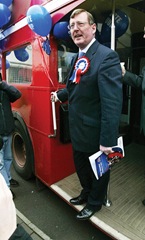After the collapse
 With only one MP the UUP were able to make more in- roads after devolution but they found themselves hampered by the economic downturn.
With only one MP the UUP were able to make more in- roads after devolution but they found themselves hampered by the economic downturn.
In 2005 the Ulster Unionist manifesto stated that they were “simply British” and the party pledged they would put Northern Ireland “at the heart of the union”. Five years later they are part of an often complicated partnership with the Tories and were left without an MP following Sylvia Hermon’s resignation.
Understandably, circumstances change, but the party’s introductory comment that “we do not intend to re-enter an Executive that includes Sinn Féin”, seems to ring hollow after three years of just such an Executive. However in 2007 they changed tack when Sinn Féin accepted policing.
Prior to devolution, Sylvia Hermon had limited powers to make an impact on Westminster decisions but after May 2007 the UUP were able to exert an influence on health and employment programmes.
From the outset, the party pledged to “create primary care groups allowing GPs not administrators to make key decisions” and later in 2005, the then Health Minister Shaun Woodward launched the Primary Care Strategic Framework. This manifesto pledge could have been pre-emptive of a decision the party knew was already on the cards, but in the last two years Michael McGimpsey has followed through and continued to announce or open primary care centres.
They also said they would reduce bureaucracy in the health system by replacing the four health boards with one health authority; on 1 April 2009 the Health and Social Care Board was created, subsuming the four previous boards. However, since McGimpsey took on the health ministry he has been forced to make efficiency savings of £700 million from 2008 to 2011. This has resulted in often controversial hospital, social and primary care cuts.
In education the UUP advocated the replacement of five education boards with one education authority. Sinn Féin hold that remit and the UUP disagree with the way in which Caitríona Ruane is implementing the Education and Skills Authority.
Not foreseeing the current furore over the 11 plus, the party called for “a new fairer method of academic selection.” They see assessment via statutory literacy and numeracy tests, spread throughout primaries six and seven, as an option for enabling academic criteria to have appropriate role in post-primary transfer.
Child protection legislation was also on their agenda in 2005 with campaigns to improve the volunteer vetting system and an extension of the Sexual Offences Act to Northern Ireland. In September 2009 the Home Office introduced the vetting and barring system. This has been criticised as an intrusive Labour initiative because it covers parents transporting children to and from sports clubs. The Sexual Offences Order (Northern Ireland) 2008 also updated the law.
A pledge to replace the New Deal benefits scheme with a training programme was fulfilled in 2008 when Reg Empey introduced the Steps to Work programme, where jobseekers are given an advisor and can re-train or upskill while getting benefits. However, the unforeseen economic downturn means that the candidates find it harder to get jobs or placements.
National and international security was an important issue with the party supporting the war on terror and calling on the US and other NATO allies to take “firm action” against terrorist organisations in Northern Ireland. To this end the Continuity IRA and the Real IRA are still included on the US list of foreign terrorist organisations which means they are being watched closely and the US is working to curb their funding avenues.
Local policing was also a priority, with the manifesto stating: “We want more police officers on our streets. That is why we support keeping the full-time reserve and abolishing the 50:50 recruitment rule.”
This was a disappointing area for the party as in September 2007 Ronnie Flanagan announced that a decision had been taken to reduce the full-time reserve and abolish it completely by March 2011. In addition, the 50:50 rule is only due to end next year when an estimated 30 per cent of police officers will be Catholics.
Summed up
· 1 MP
· 127,414 votes
· 17.8% overall share
· 34.3% unionist share
Assessment
· Some success in health
· Economic downturn held back progress
· No impact on policing





